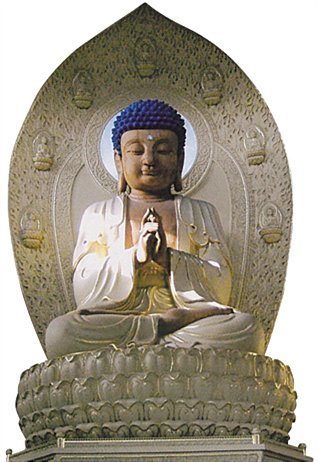21. Vairocana Buddha on a lotus throne,
date unknown, Hangzhou, China.
Buddha speaks on Mara, the personification of evil (Pali Canon):
To me –
resolute in exertion
near the river Nerañjara,
making a great effort,
doing jhana
to attain security from bondage –
Namuci (Mara) came,
speaking words of compassion:
“You are ashen, thin.
Death is in
your presence.
Death
has 1,000 parts of you.
Only one part
is your life.
Live, good sir!
Life is better.
Alive,
you can do
acts of merit.
Your living the holy life,
performing the fire sacrifice,
will heap up much merit.
What use is exertion to you?
Hard to follow
– the path of exertion –
hard to do, hard
to sustain.”
Saying these verses,
Mara stood in the Awakened One’s presence.
And to that Mara, speaking thus,
the Blessed One said this:
“Kinsman of the heedless,
Evil One,
come here for whatever purpose:
I haven’t, for merit,
even the least bit of need.
Those who have need of merit:
those are the ones
Mara’s fit to address.
In me are conviction,
austerity,
persistence,
discernment.
Why, when I’m so resolute
do you petition me
to live?
This wind could burn up
even river currents.
Why, when I’m resolute
shouldn’t my blood dry away?
As my blood dries up
gall and phlegm dry up.
As muscles waste away,
the mind grows clearer;
mindfulness, discernment,
concentration stand
more firm.
Staying in this way,
attaining the ultimate feeling,
the mind has no interest
in sensual passions.
See:
a being’s
purity!
Sensual passions are your first army.
Your second is called Discontent.
Your third is Hunger and Thirst.
Your fourth is called Craving.
Fifth is Sloth and Torpor.
Sixth is called Terror.
Your seventh is Uncertainty.
Hypocrisy and Stubbornness, your eighth.
Gains, Offerings, Fame, and Status
wrongly gained,
and whoever would praise self
and disparage others.
That, Namuci, is your army,
the Dark One’s commando force.
A coward can’t defeat it,
but one having defeated it
gains bliss.
Do I carry munja grass?
I spit on my life.
Death in battle would be better for me
than that I, defeated,
survive.
Sinking here, they don’t appear,
some priests and contemplatives.
They don’t know the path
by which those with good practises
go.
Seeing the bannered force
on all sides –
the troops, Mara
along with his mount –
I go into battle.
May they not budge me
from
my spot.
That army of yours,
that the world with its devas
can’t overcome,
I will smash with discernment –
as an unfired pot with a stone.
Making my resolve mastered,
mindfulness well-established,
I will go about, from kingdom to kingdom,
training many disciples.
They – heedful, resolute
doing my bidding –
despite your wishes, will go
where, having gone,
there’s no grief.”
… As [Mara] was overcome with sorrow,
his lute fell from under his arm.
Then he, the despondent spirit,
right there
disappeared.
[Snp III.2]
Rajagriha, the capital of Magadha, was the seat of Bimbisara, who was then one of the most powerful princes in the eastern valley of the Ganges. The city was situated in a pleasant valley, closely surrounded by five hills, in the most northerly offshoot of the Vindhya Mountains. In the caves on these hillsides, several hermits had found it convenient to settle. There they were free from the dangers of more disturbed districts and near enough to the town where they procured their simple supplies, while remaining surrounded by the solitude of nature. Gautama first attached himself to one of these Brahman teachers, named Alara; however, he became dissatisfied with Alara’s system and turned to another teacher named Udraka, learning under them all that Hindu philosophy had then to teach about this world or the next.
